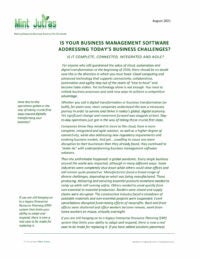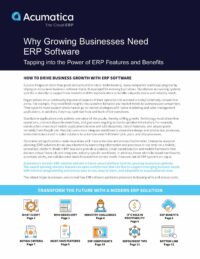The Benefits of Cloud ERP
According to a CIO article on ERP trends, the move the cloud is definitely happening, and the benefits are clear. Author Yashvendra Singh writes: “By taking their ERP solutions to the cloud, CIOs can benefit from lower costs, new functionality, mobility, simpler deployment, elasticity, less need for internal IT resources, and the ability to add users and functions to accommodate business growth.
Let’s look more closely at a few of the many benefits businesses can expect when implementing a cloud ERP solution.
Lower Operational and Implementation Costs
High operational and implementation costs have often been touted as major reason for not investing in an ERP solution. This is a valid concern when choosing an on-premises system, which requires companies to invest in the solutions’ software, the software’s license, and the required hardware. And the companies’ IT departments are tasked with finding a location to store the hardware, installing the hardware, and maintaining the hardware (e.g., support, updates, and security), which takes a lot of time, money, and energy.
Cloud ERP solutions, on the other hand, charge a subscription fee that covers the cost of using the software, the amount of resources used, and the number of users. Because users access the software over the internet using any web-enabled device, implementation is easier and faster than an on-premises solution. And the cloud ERP vendor provides automatic updates while also shouldering the responsibility for maintenance and security.
Complete Mobility for Users
According to Forbes, remote work is here to stay, which means organizations must provide their workforce with the ability to work from home. With a cloud ERP solution, mobility is a built-in capability. Other than needing a reliable internet connection and a cloud-forward device, the ERP solution allows employees to effortlessly connect to the ERP solution from any location and time zone. Viewing information, communicating with team members, sharing files (and much more) is possible with a click of a button.
Powerful Data Backup and Security
As previously noted, data security for traditional on-premises ERP solutions rests with a company’s IT experts. Security in an on-premises ERP solution includes instituting backup and recovery measures, such as storing data on hard drives, disks, and/or onsite servers. Sadly, should a catastrophic event damage the hardware and/or system, the data may be irretrievable.
In contrast, cloud ERP solutions are hosted on secure platforms, such as Amazon Web Services (AWS), that encrypt all data that enters their global networks. And cloud ERP vendors—who know their reputations are on the line and who don’t want to pay for a data breach—monitor, test, and backup their customers’ data as well as protect their customers from increasingly sophisticated cyberattacks.




